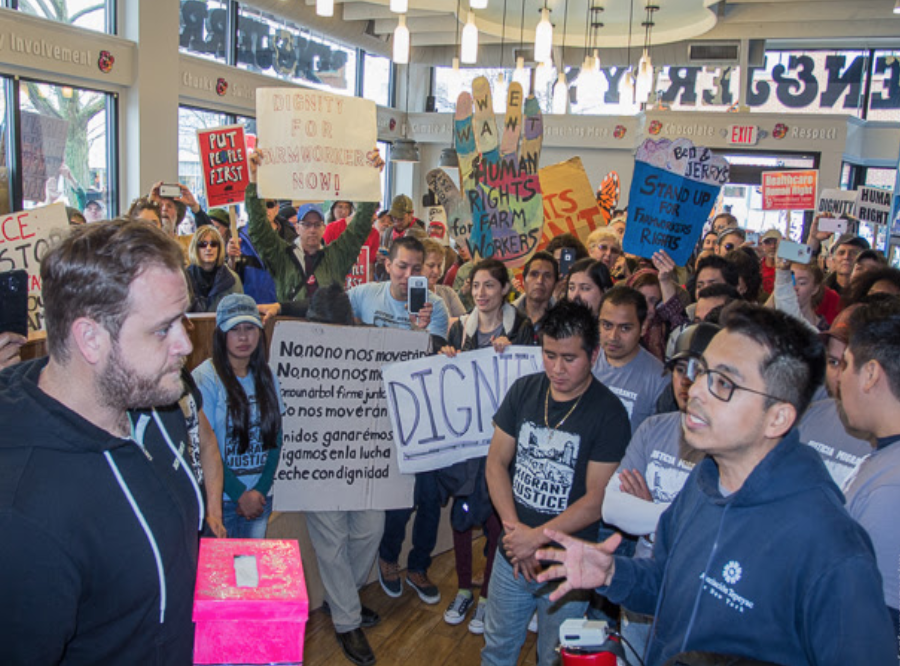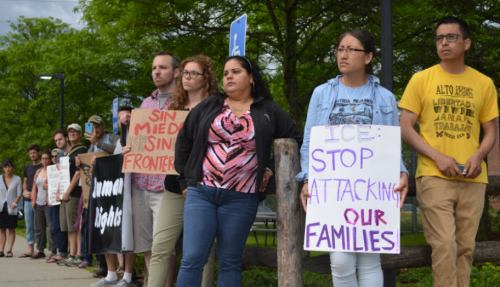Organizing for Immigrant Justice and a Just Food System in Vermont with Migrant Justice
An interview with Migrant Justice’s Campaign Coordinator, Abel Luna

How is immigration policy linked to agriculture and food policy?
Immigration, agricultural and food policy are all based on the exclusion of our community. The way our country’s immigration policies are set up does not recognize our fundamental humanity. I would link this to foreign policy as well, which kicks people off their land in their home countries -- making it impossible for us to make a living and sustain our families. The result is for us to leave our homes and families behind to come to the country that is responsible for our displacement to begin with.
And when we get here, we’re told we aren’t “legal” and face discrimination. If you’re a person of color and you don’t have papers that give you legal status, you’re discriminated against, incarcerated, and deported. In Vermont, for example, there’s a lot of targeting from immigration. It means you aren’t treated as a human being and don’t have dignity. The state needs immigrant workers, but when we try to speak up for our rights, we’re targeted and persecuted.
The agricultural and food systems thrive on this vicious circle. People get here and are told they have no rights. You are just a worker, not a human being. You are meant to have low wages and no dignity. That’s the way that corporations survive, by paying people very little money. That’s how they get richer and richer. And everybody else gets screwed.
Agricultural and food policies are designed to exclude people and keep them from thriving. Farmworkers are never invited to the table. It’s the people who are feeding the country who have the least access to rights, or to healthy food for that matter. The system’s not broken; this is what it’s designed to do.
What are your biggest fears in this moment? What opportunities do you see?
We have this president who has no respect for the dignity of human beings. Our rights are violated, and when people speak up about it, there’s retaliation and targeting. Folks are afraid to stand up for their human rights because they’re worried about being deported.
But there’s an opportunity there, too. People are realizing that we have to organize, that we can’t just stay silent. There’s always been this fear, but we came out of the shadows to fight to make these improvements and we aren’t going back again. So many people are organizing and waking up now, and this gives us an opportunity to create a stronger, more resilient movement.
Is there specific policy you are currently driving or endorsing? How can the NESAWG network plug in or support your work?
Milk with Dignity is a human rights program designed and built by farmworkers who are at the center of agricultural and immigration systems [Ed note: for more about Milk With Dignity, see this interview with Rafaela Rodriquez]. We created this program to ensure that the rights and dignity of farmworkers are respected by having dairy companies require that farms in their supply chain uphold a farmworker-authored code of conduct and allow an independent third-party to audit and ensure compliance. The companies pay a premium to those farms and commit to enforcing market consequences against farms that are suspended from the program.
Milk with Dignity brings farmworkers and farmers together to realize that we have a common interest. We are both suffering in a market that is increasingly dominated by just a few corporations and is paying farmers for their milk at prices below the cost of production. The program allows us to stand up together against this system.
One of the things that Milk with Dignity does is to make visible the conditions in a given company’s supply chain, and to hold the company responsible for those conditions. It brings consumers into the conversation and gives them a vehicle to demand that products are produced with dignity.
As Migrant Justice looks to expand the Milk with Dignity program to cover more dairy companies and their supply chains, we will need the support of NESAWG network participants to help bring those companies to the table and recognize that it’s in their interest as well to sign onto the program.

Of course we need to have comprehensive immigration reform that will provide permanent protection for all immigrants in the country. But we know that with the current administration, any law that passes would only be used to further criminalize our community. We aren’t just waiting around for an immigration reform that is years away at best; we are finding ways to take action now to address the needs of our community. That’s what Milk with Dignity is about. It doesn’t matter what your immigration status is; you deserve rights and dignity in the workplace. And we can create solutions now.
We are all consumers, and more and more people have this idea of conscious consumerism, of “voting with your dollars.” But this kind of tactic only works when it’s done alongside and in support of workers who are organizing. It’s not just about choosing to buy a product with more sustainable-sounding marketing; it’s about using the privilege you have to support worker-led movements. We have to be vigilant and intelligent and make those choices count, so they actually hold companies accountable. When immigrant farmworkers in the food system are targeting a company for its practices, we have a collective responsibility to act as consumers to put pressure on that company to align with the workers’ demands.

What do you want the larger agricultural community to know about immigrants, immigration and/or immigrant advocacy?
Immigrant farmworkers in Vermont have created a program that works. Milk with Dignity is delivering results and bringing about the new day that we have dreamed about for so long. Workers are now able to speak up on the job and to have their rights protected without fear of retaliation. This is a solution that workers have created for themselves, but it wouldn’t have been possible without the support of allies.
In order to create the space needed to organize for this momentous victory, we have had to fight back against the criminalization and targeting of our community. We have had to create policy preventing the police from collaborating with immigration, and when police have violated that policy, we’ve held them accountable. These kinds of campaigns are needed for food justice as well. And we will continue to organize to make sure that those who abuse human rights are held responsible -- that there are consequences -- because it’s not a just system when those who are putting food on your table are being detained and deported.
Anything else?
The food movement needs to expand its definition of sustainability to include human beings. Is it sustainable for farmworkers and other workers who are producing the food? If the answer is no -- if it’s being produced in a way that’s not respecting the dignity of the worker -- then it’s not sustainable and shouldn’t be part of our movement.
Migrant Justice is an organization founded and led by immigrant farmworkers in Vermont. Since 2009, Migrant Justice has led a number of groundbreaking campaigns for human rights and economic justice. The organization has developed Milk with Dignity, a worker-driven program to ensure human rights for farmworkers in the dairy industry. More information can be found at migrantjustice.net
Abel Luna began working as a farmworker at 15 years old. He later worked with the Rural & Migrant Ministry in New York, winning legislative victories for agricultural workers, including improving minimum wage laws. Abel is Migrant Justice’s Campaign Coordinator.
